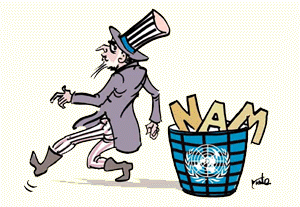11th February 2001
NAM fights against divide and rule
Front Page|
News/Comment|
Plus| Business| Sports|
Mirror Magazine

![]()

In an interview with a visiting New York Times reporter, he said the only genuinely "non-aligned" countries in the world were the United States and the Soviet Union.
All others, he pointed out, were aligned either to one or the other of the two superpowers at the height of the Cold War.
However, after the fall of the Berlin Wall in 1989- and the disintegration of the Soviet Union— there was no Cold War to speak of.
But still NAM has continued into the 21st century, although it is badly in need of a new nomenclature.
When Cuba tookover the chairmanship from Sri Lanka in 1979, the New York Times, as part of a conscious editorial policy, insisted on describing NAM as "the so-called" Non-Aligned Movement.
Every single New York Times story and editorial during Cuba's three-year NAM tenureship carried that sarcastic label.
The Times took the view that Cuba was far too closely aligned with the then Soviet Union to qualify for chairmanship of NAM - although the Movement itself barred from membership only countries which had contractually agreed to provide military bases to one or the other of the superpowers.
But long after the end of the Cold War, some of NAM's political mandate still remains valid: nuclear disarmament, the right to self determination, the elimination of terrorism, the protection of national sovereignty, and the elusive goal a Palestinian homeland.
"At Bandung in 1955, the birth of non-alignment was an act of stunning, world-transfixing boldness. International politics were fundamentally and forever transformed," former UN Secretary-General Boutros Boutros-Ghali of Egypt declared at the 11th Nonaligned Summit meeting in Colombia in 1995.
As he pointed out, non-alignment derived its political force from a new principle: the principle of solidarity.
But last month the outgoing US Ambassador to the United Nations Richard Holbrooke tried an old tactic to break that solidarity: divide and rule.
In one of his farewell addresses to the African Group at the United Nations, Holbrooke said: "I respectfully ask the African countries here today to reconsider their association with the Non-Aligned Movement. The Non-Aligned Movement is not Africa's friend at this point. Your goals and NAM's are not synonymous."
Although Holbrooke is no longer the US ambassador - the post remains vacant under the new Bush Administration - the US Mission to the United Nations has circulated Holbrooke's speech as a UN document of the General Assembly giving it official credence.
Holbrooke told the African Group that Africa's voice is weakened because of its association with NAM.
"I have not seen a single issue in which NAM positions actually benefited the African Group."
The US envoy also said that the 114-member NAM, the largest single political group at the United Nations, should either cease to exist as a separate caucus or merge with the Group of 77 (G-77) developing nations.
The G-77, the largest single economic group at the United Nations, consists of 133 members - and most developing nations are members of both groups.
Holbrooke said that African nations "should consider distancing themselves from NAM". "So that you can protect African interests and not allow yourself to be pushed by less than 10 radicalised States into positions that you don't need."
But last week, NAM counter-attacked. By a coincidence the current chair is from Africa.
So it was left to the South African ambassador, in his capacity as chairman of NAM, to respond.
Holbrooke's proposal, he said, was an insult to the entire membership of the Movement. "This attempt by a non-NAM member to prescribe to the African members of the Movement is, at best uninformed, or at worst, misguided, misleading and constitutes an affront to NAM members as a whole."
"The decision by the US Mission to publish the statement under the General Assembly agenda can only be seen as an attempt to question the legitimacy of NAM," South African Ambassador Dumisani Shadrack Kumalo said.
In a letter to NAM members, Kumalo said: "For our people, NAM will always be remembered for having stood steadfast in support of our struggle against apartheid whilst many outside NAM were either complacent or supportive of the racist regime of our past," he adds.







Editorial/ Opinion Contents
![]()
Front Page| News/Comment| Editorial/Opinion| Plus| Business| Sports| Mirror Magazine
Please send your comments and suggestions on this web site to


